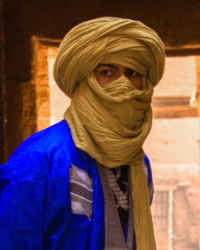Bedouins traditionally live a nomadic lifestyle, spreading from the Persian Gulf to the Atlantic Ocean, and from the borders of Turkey to Yemen. The word 'bedouin' comes from the Arab word 'Bedou' that means "desert dweller." Estimates say nomadic Bedouins constitute about one-tenth of the population of the Middle East.
Bedouins are divided into tribal groups, one of which is the Yahia. The Yahia speak an Algerian form of Arabic. What we can say about any Bedouin tribe usually applies to all, including the Yahia Bedouins.
Yahia Bedouin life is generally pastoral, raising camels, sheep, goats and cattle. They normally migrate seasonally, depending on grazing conditions. In winter, when there is some rain, they migrate deeper into the desert. In the hot, dry summers, they camp around secure water sources.
Bedouins define themselves as members of tribes and families. People are divided into social classes, depending on ancestry and profession. Passing from one class to another is relatively feasible, but marriage between a man and a woman of different classes is difficult.
Traditionally, the Yahia Bedouin's home, the tent, is divided into three sections by curtains: the men's section, the family section and the kitchen. In the men's area, guests are received around the hearth where the host prepares coffee on the fire. This is the center of Yahia Bedouin social life. Tea is served as a welcome drink; coffee is usually prepared after the meal and is the last drink before the guest leaves. The serving of food and drink represents the generous hospitality of the host. The men pass the evening trading news and discussing their animals. Separated from them by a curtain, the women gather in the family area and kitchen along with their small children to bake bread and prepare the main meal. A dinner of rice and chunks of mutton or lamb are then served to the gathered guests.
Women occupy a very important position in Yahia Bedouin society. Not only do they raise the children, herd the sheep, milk the animals, cook, spin yarn and make the clothes, but they also weave the cloth that constitutes the tent. Yahia Bedouin men gather around the fire, sharing stories and sipping coffee. They might discuss falconry, the saluki greyhound and Arabian stallions, all animals Bedouins are credited with raising, as well as other matters of importance to the tribe. Traditionally, one of the men recites poetry or sings. To mark the end of the evening, the host burns incense in a mabkhara (incense burner) passing it to each of his guests to inhale and fan their clothes.
Poetry has been a central cultural form of expression for the Bedouins throughout their history. In early centuries of Islamic history, Bedouin poetry represented the ideal standard for other literary achievements, as well as for the Arabic language.
The traditional foods of the Yahia Bedouin are dairy products and meat. Bedouins sell and barter products to obtain agricultural food from sedentary peoples.
Yahia Bedouin society has a strict code of honor which dictates proper behavior for all members, including children. Because of the demanding nature of the Bedouin lifestyle, children are expected to assume a considerable amount of responsibility to help their families survive. Although modernization has changed the Yahia Bedouin lifestyle somewhat, they emphasize teaching children to carry on traditional ways of life. They do not regard advanced technology as being important to a child's education.
Modern societies have made the traditional Yahia Bedouin lifestyle less attractive since as it is demanding and often dangerous. Because of that, many tribes have settled in urban areas. It is not uncommon to see a young Bedouin building a house and living in it; however, his parents will pitch their tent in the garden where they will live very happily until the end of their days. Governments have a strong tendency to regulate nomadic lifestyles since it is only then that taxation works. Providing services for the people also works best in an urban setting. Today, the Arab world has one of the highest rates of urbanization in the world. As time progresses, more Yahia Bedouins are likely to live in cities.
Islam's prophet Mohammed was born and raised in the merchant tribe of the Quraish. The Koran, first revealed to Mohammed, was later written and compiled in the Arabic language. The first converts to Islam came from the Bedouin tribes living in and around Mecca. Therefore, Islam is embedded and deeply rooted in Bedouin culture. Although there are pockets of Christians in Bedouin tribes, by and large the word Bedouin is synonymous with being a follower of Islam. Prayer is an integral part of Bedouin life. As there are no formal mosques in the desert, they pray where they are, facing Mecca and performing the ritual washing, preferably with water. Since water is not always readily available, they 'wash' with sand instead.
Yahia Bedouins are faced with challenges in their lifestyle, as their traditional Islamic, tribal culture has begun to mix with western practices. Men are more likely to adjust and interact with the modern cultures, but women are bound by honor and tradition to stay within the family dwelling. They therefore lack opportunity for advancement.
Yahia Bedouins are almost untouched by the gospel. Christian resources are available in the Algerian Arabic language, the Yahia Bedouin's mother tongue.
Pray for gospel resources to reach the Yahia Bedouins in Morocco, and for them to receive them.
Pray for spiritual discernment among the Yahia Bedouins.
Pray for the Lord to send dreams and visions to Yahia Bedouin family leaders.
Pray for dedicated workers to go to the Bedouin peoples of Morocco.
Scripture Prayers for the Bedouin, Yahia in Morocco.
Middle East Resources
| Profile Source: Joshua Project |










